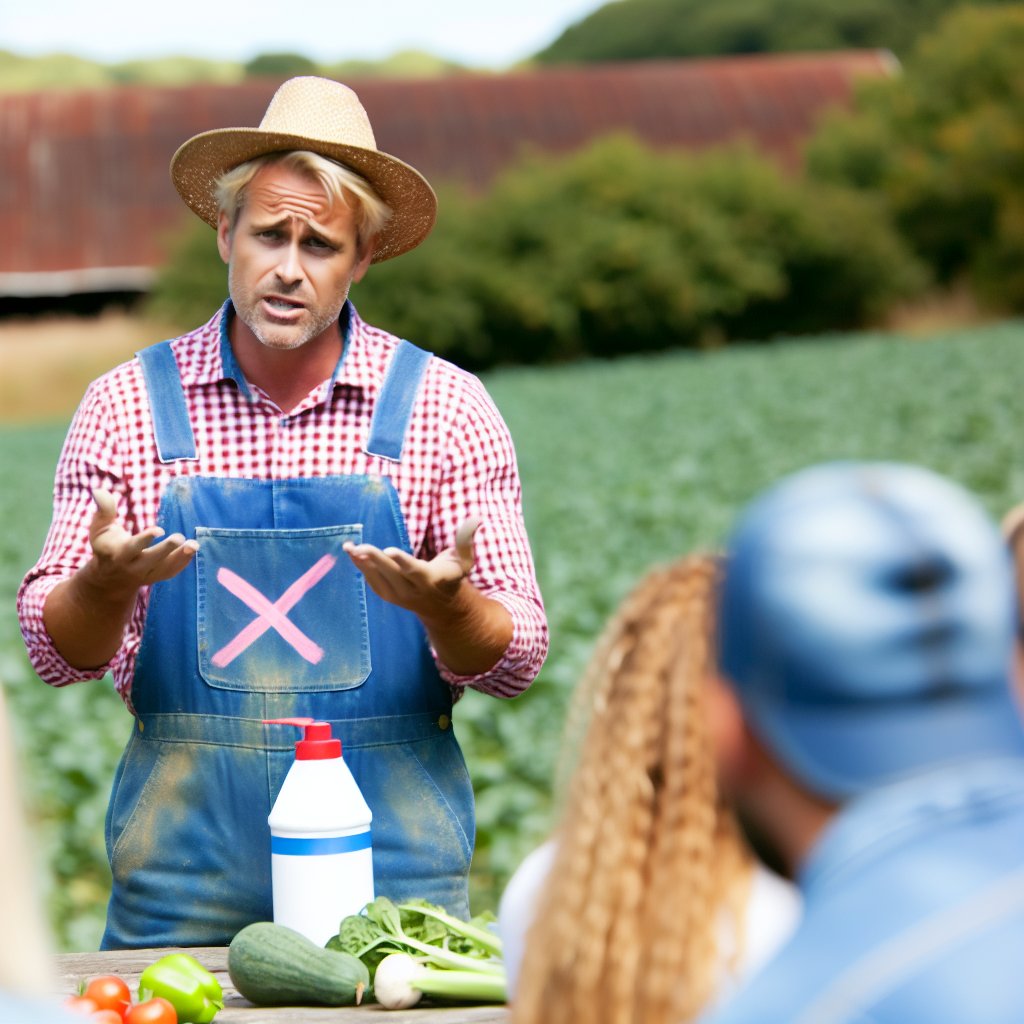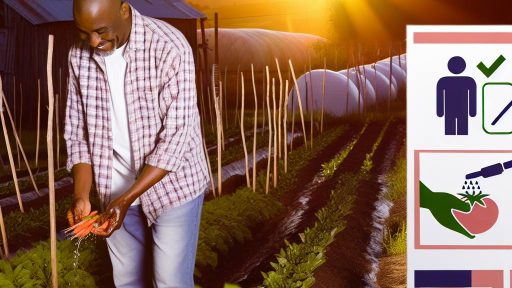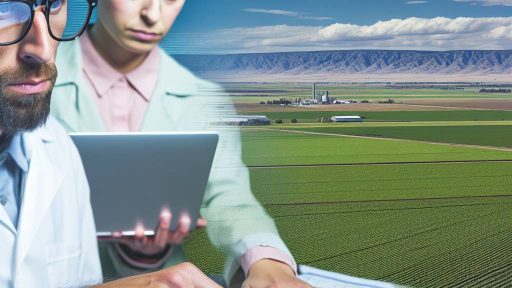Overview of Pesticides and Their Use in Agriculture
Definition of Pesticides
Pesticides are chemical substances used to control pests and diseases.
They include insecticides, herbicides, fungicides, and rodenticides.
Farmers apply these chemicals to protect crops from harmful organisms.
Consequently, pesticides play a vital role in modern agriculture.
Types of Pesticides
Farmers use various types of pesticides, each serving a specific purpose.
Insecticides target insects that threaten crops.
Herbicides eliminate unwanted weeds competing for nutrients.
Fungicides are essential for controlling fungal diseases in plants.
Rodenticides control rat and mouse populations that damage crops.
Benefits of Pesticide Use
Pesticides contribute to increased agricultural productivity.
They help ensure food security by maximizing crop yields.
Moreover, effective pest control results in higher quality produce.
This increased quality can lead to enhanced marketability.
Risks and Challenges
Despite their benefits, pesticide misuse poses significant risks.
Improper application can lead to environmental contamination.
Transform Your Agribusiness
Unlock your farm's potential with expert advice tailored to your needs. Get actionable steps that drive real results.
Get StartedIt also endangers human health and non-target organisms.
Farmers must adhere strictly to guidelines for safe usage.
Regulatory Framework
Governments regulate pesticide use to protect public health and the environment.
In the United States, the Environmental Protection Agency oversees pesticide approval.
They evaluate safety and effectiveness before granting usage permits.
Countries often have their own regulatory bodies to enforce these standards.
Definition of Pesticide Misuse and Its Types
Understanding Pesticide Misuse
Pesticide misuse occurs when pesticides are applied incorrectly.
This can involve using the wrong product for a specific crop.
Additionally, it can mean applying too much or too little pesticide.
Misuse may also happen if the pesticide is used in a way that violates regulations.
It is crucial to understand what constitutes misuse to promote safe practices.
Types of Pesticide Misuse
There are several types of pesticide misuse that farmers should be aware of.
- Improper application techniques pose significant risks.
- Using outdated or illegal pesticides can harm crops and the environment.
- Mixing incompatible chemicals may lead to dangerous reactions.
- Failing to adhere to safety guidelines jeopardizes health.
Each type of misuse has serious legal implications.
Legal Requirements and Regulations
Farmers must comply with various local and national regulations.
These regulations dictate how and when pesticides can be used.
Failure to follow these laws can result in penalties and fines.
Moreover, legal actions may arise from damages caused by misuse.
Consequences of Pesticide Misuse
The consequences of pesticide misuse extend beyond legal penalties.
They can include environmental damage and harm to human health.
Misuse may lead to loss of crop yield and increased production costs.
Additionally, farmers may suffer reputational damage from misuse incidents.
Legal Framework Governing Pesticide Use
National Laws
Each country has established regulations for pesticide usage.
These laws aim to protect public health and the environment.
In the United States, the Environmental Protection Agency (EPA) oversees pesticide regulation.
Showcase Your Farming Business
Publish your professional farming services profile on our blog for a one-time fee of $200 and reach a dedicated audience of farmers and agribusiness owners.
Publish Your ProfileThe Federal Insecticide, Fungicide, and Rodenticide Act (FIFRA) sets the basic framework.
This act requires pesticides to be registered before use.
Each registration involves a rigorous approval process.
Additionally, many states have their own pesticide management programs.
These programs often include licensing requirements for pesticide applicators.
International Treaties
Internationally, several treaties govern pesticide use.
The Stockholm Convention on Persistent Organic Pollutants is a key treaty.
This treaty aims to eliminate or restrict the use of certain hazardous pesticides.
The Rotterdam Convention regulates the international trade of pesticides.
It promotes shared responsibility between exporting and importing countries.
These treaties reflect a global commitment to safe pesticide practices.
Consequences of Misuse
Pesticide misuse can lead to severe legal consequences.
Farmers can face fines, legal action, and loss of licenses.
In serious cases, criminal charges may be applied.
Misuse can also trigger civil lawsuits from affected parties.
Additionally, environmental damage may result in costly cleanup efforts.
This reflects the importance of compliance with established laws.
Enforcement Mechanisms
Regulatory bodies actively monitor pesticide use compliance.
The EPA conducts inspections and investigations into pesticide misuse.
States often have their own enforcement teams for local regulations.
Enforcement actions can include penalties and corrective measures.
Public reporting channels allow individuals to report violations.
This creates a collaborative approach to ensure safe practices.
Uncover the Details: Funding Opportunities Through Conservation Programs
Consequences of Pesticide Misuse: Environmental Impact
Soil Degradation
Pesticide misuse leads to significant soil degradation.
It disrupts the natural microbial communities essential for soil health.
This disruption impairs the soil’s nutrient cycling processes.
Consequently, soil fertility decreases, affecting crop yields.
Water Contamination
Pesticides can easily contaminate local water sources.
Runoff during rainfall carries these chemicals into rivers and lakes.
This contamination affects aquatic ecosystems and drinking water quality.
In addition, it poses health risks to local communities.
Impact on Biodiversity
Misuse of pesticides threatens local biodiversity.
Non-target species, including beneficial insects, suffer population declines.
This decline disrupts the balance of local ecosystems.
As a result, pollination and other ecosystem services are compromised.
Air Quality Issues
Applying pesticides can negatively impact air quality.
Volatile organic compounds may evaporate and enter the atmosphere.
This can result in harmful respiratory issues for agricultural workers.
Furthermore, airborne pesticides may drift into neighboring areas.
Showcase Your Farming Business
Publish your professional farming services profile on our blog for a one-time fee of $200 and reach a dedicated audience of farmers and agribusiness owners.
Publish Your ProfileLong-term Environmental Effects
The long-term effects of pesticide misuse are profound.
Persistent chemicals can remain in the environment for decades.
They accumulate in soil and water, leading to chronic toxicity.
This persistence poses ongoing risks to human health and the environment.
Uncover the Details: The Role Of Government Agencies In Pesticide Regulation
Health Risks Associated with Pesticide Misuse for Farmers and Consumers
Potential Health Risks for Farmers
Pesticide misuse poses significant health risks to farmers.
Repeated exposure to harmful chemicals leads to various health issues.
Farmers may experience respiratory problems from inhaling pesticides.
Skin contact with pesticides can cause dermatitis and other reactions.
Additionally, pesticide ingestion can lead to serious poisoning cases.
Long-term exposure has been linked to chronic illnesses, including cancer.
Farmers should prioritize proper handling and application techniques.
Impact on Consumer Health
Pesticide misuse does not only affect farmers but consumers too.
Residues on produce can pose health risks for consumers.
Some individuals may experience allergic reactions to pesticide residues.
Consumption of contaminated food can lead to gastrointestinal issues.
Severe pesticide exposure may also result in neurological disorders.
Children and pregnant women are particularly vulnerable to these effects.
Environmental Consequences and Indirect Health Risks
Misusing pesticides can have broader environmental implications.
Contaminated runoff can pollute local water sources.
This pollution impacts aquatic life and disrupts ecosystems.
Furthermore, it can ultimately affect the food supply chain.
When ecosystems collapse, it can indirectly harm human health.
Community health can suffer due to poisoned water and air quality.
Thus, responsible pesticide use is essential for everyone’s safety.
Delve into the Subject: The Role of Farm-To-Table Policies in Supporting Rural Agriculture
Case Studies on Legal Action Taken Due to Pesticide Misuse
Overview of Notable Cases
Several critical legal cases highlight the consequences of pesticide misuse.
These cases illustrate the importance of adhering to regulations.
For instance, in 2015, a significant case involved GreenFarm Co.
The company faced allegations of using banned pesticides on crops.
This practice led to serious health concerns in nearby communities.
Consequently, the state government imposed hefty fines on GreenFarm.
Impact of Misuse on Farmers
Pesticide misuse affects farmers in several ways.
First, farmers may face legal actions and fines.
Second, their reputations suffer, impacting future sales.
For example, Jonathan Fields, a farmer in Nebraska, faced lawsuits.
His improper application of a pesticide led to crop damage.
Local authorities fined him significantly for his actions.
Legal Framework Governing Pesticide Use
The legal framework around pesticide use is strict and comprehensive.
The Environmental Protection Agency regulates these substances closely.
Showcase Your Farming Business
Publish your professional farming services profile on our blog for a one-time fee of $200 and reach a dedicated audience of farmers and agribusiness owners.
Publish Your ProfileFarmers must comply with federal and state laws regarding application.
Failure to do so can lead to immediate legal repercussions.
In response, farmers must remain informed about regulations.
Moreover, many companies offer educational resources to aid compliance.
Consequences of Non-Compliance
Non-compliance with pesticide regulations can lead to severe consequences.
It includes not only fines but also criminal charges in extreme cases.
Furthermore, non-compliance can result in lawsuits from affected parties.
Communities may sue for damages caused by pesticide misapplication.
In 2020, a landmark case in California highlighted these issues.
Landowners successfully sued a farm for pesticide drift affecting their properties.
Recommendations for Responsible Usage
Farmers should take proactive measures to ensure regulatory compliance.
Seeking training and proper resources can mitigate risks.
Moreover, staying updated on pesticide regulations is essential.
Establishing a plan for real-time monitoring can also help.
Ultimately, responsible pesticide use sustains agriculture and protects communities.
Gain More Insights: Ensuring Compliance With Chemical Storage Laws

Role of Regulatory Agencies in Enforcing Pesticide Laws
Overview of Regulatory Agencies
Regulatory agencies play a vital role in pesticide management.
They create and enforce laws governing pesticide use.
These agencies ensure compliance with environmental and health standards.
Key Responsibilities
Regulatory agencies perform several critical functions.
They evaluate the safety and efficacy of pesticides before approval.
Additionally, they conduct inspections of farms and retailers.
Also, they monitor pesticide usage and environmental impacts.
Finally, they respond to violations and enforce penalties.
Enforcement Mechanisms
Enforcement involves various strategies to ensure compliance.
Agencies use inspections and audits to assess farms and distributors.
Moreover, they issue fines for non-compliance with regulations.
In some cases, they may suspend or revoke pesticide licenses.
Collaboration with Farmers
Agencies work closely with farmers to promote safe practices.
They provide education on proper pesticide handling and application.
Furthermore, they encourage reporting of misuse or incidents.
Collaboration fosters a culture of safety and responsibility.
Public Awareness and Education
Regulatory agencies also focus on raising public awareness.
They conduct campaigns to inform the public about pesticide safety.
Furthermore, they highlight the potential risks of pesticide misuse.
Educational programs help communities understand best practices.
Preventive Measures and Best Practices for Farmers
Proper Understanding of Pesticide Regulations
Farmers must familiarize themselves with local pesticide regulations.
They should stay updated on any changes regularly.
Understanding these regulations helps prevent legal mishaps.
Comprehensive Training Programs
Implement training programs for all farmworkers.
Showcase Your Farming Business
Publish your professional farming services profile on our blog for a one-time fee of $200 and reach a dedicated audience of farmers and agribusiness owners.
Publish Your ProfileThese programs should cover safe pesticide handling techniques.
Proper training reduces the risk of accidental misuse.
Personal Protective Equipment (PPE)
Farmers must provide appropriate PPE to all workers.
Wearing PPE minimizes exposure to harmful chemicals.
Regular checks can ensure the equipment is in good condition.
Effective Application Techniques
Farmers should adopt best practices for pesticide application.
Using the right equipment enhances application efficiency.
They must avoid applying pesticides on windy days.
Environmental Impact Considerations
Consider the environmental impact of pesticide use.
Implement buffer zones around sensitive areas, like water bodies.
This can reduce contamination risks to surrounding ecosystems.
Regular Monitoring and Record-Keeping
Maintain accurate records of pesticide usage.
Regular monitoring helps identify potential misuse patterns.
This practice is essential for compliance and accountability.
Community Engagement and Transparency
Engage with neighboring farmers and the local community.
Share information about pesticide usage and practices.
Transparency builds community trust and promotes safer practices.
Legal Rights of Farmers and Consumers Regarding Pesticide Use
Understanding Farmers’ Responsibilities
Farmers must adhere to pesticide regulations to protect public health.
Compliance includes following label instructions when using pesticides.
Additionally, farmers must keep accurate records of pesticide applications.
Failure to meet these regulations can lead to severe penalties.
Rights of Farmers
Farmers have the right to access safe and effective pesticides.
They can seek legal redress for unfair treatment by pesticide manufacturers.
Furthermore, farmers have the right to information about the chemicals they use.
This includes safety data sheets and proper usage guidelines.
Consumer Rights and Protection
Consumers are entitled to safe food free from harmful pesticide residues.
The government sets limits on these residues in agricultural products.
Moreover, consumers can report violations of pesticide regulations.
This reporting can prompt investigations into unsafe practices.
Legal Actions Against Misuse
Misperception of pesticide use can lead to serious legal consequences.
Misuse may result in civil lawsuits from affected individuals or communities.
Pesticide misuse can also invoke government enforcement actions.
These actions may include fines and revocation of licenses.
Importance of Education and Training
Education plays a crucial role in preventing pesticide misuse.
Farmers should undergo training on the safe application of chemicals.
Understanding the legal implications ensures compliance with regulations.
Training programs also educate consumers on their rights regarding pesticides.
Additionally, awareness campaigns can promote safer agricultural practices.
Future Trends in Agricultural Law and Pesticide Regulations
Increasing Regulatory Scrutiny
Pesticide regulations are becoming stricter globally.
Government agencies are focusing on environmental and health impacts.
Showcase Your Farming Business
Publish your professional farming services profile on our blog for a one-time fee of $200 and reach a dedicated audience of farmers and agribusiness owners.
Publish Your ProfileFarmers must adapt to new compliance requirements.
This shift aims to safeguard ecosystem health and public safety.
Advancements in Biopesticides
Biopesticides are gaining popularity as safer alternatives.
They often have lesser environmental impacts compared to chemical pesticides.
This trend prompts regulatory bodies to evaluate their usage carefully.
Farmers are encouraged to integrate biopesticides into their practices.
Innovation and Technology Integration
Technology is revolutionizing pesticide application methods.
Precision agriculture is optimizing input usage and efficacy.
Drones and sensors enhance monitoring capabilities in fields.
Farmers can reduce chemical usage while maintaining yields.
Consumer Demand for Transparency
Consumers increasingly demand transparency in farming practices.
Businesses must disclose pesticide use to retain customer trust.
This trend encourages organic and sustainable farming practices.
Farmers who embrace transparency can gain a competitive edge.
Legal Liability and Risk Management
The potential for legal liability surrounding pesticide use is growing.
Farmers must be vigilant in adhering to established guidelines.
Non-compliance with regulations can lead to significant financial losses.
Moreover, farmers should implement risk management strategies.
Collaboration Between Stakeholders
Collaboration among farmers, regulators, and scientists is becoming essential.
This cooperation aims to foster responsible pesticide use.
Sharing knowledge can aid in developing innovative farming solutions.
Partnerships can lead to more sustainable agricultural practices.




